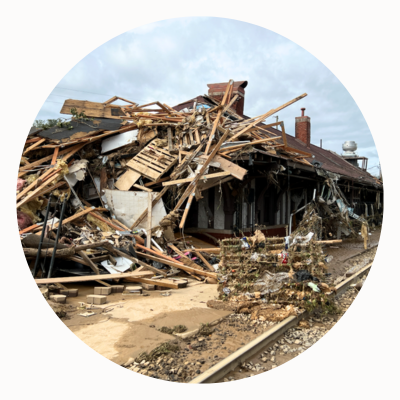Mastercard: Meet the Climatologist Mitigating Extreme-Weather Risk All Over the Map
Rhea-AI Summary
Mastercard is strengthening its climate resilience strategy through the work of Montana Eck, Director for Climate Risk and Resilience. With over 170 global sites facing various weather challenges, the company is implementing comprehensive measures to protect facilities and employees from extreme weather events. The initiative includes a detailed assessment of climate risks at each location, development of a 'Smart Resilience Checklist', and implementation of adaptation strategies like installing 'cool' pavement and creating forestry management plans. Real-time weather monitoring stations are being installed at key locations to collect data on temperature, wind speed, humidity, and rainfall to inform future resilience decisions.
Positive
- Proactive implementation of climate risk assessment and mitigation strategies across global facilities
- Development of comprehensive resilience infrastructure through Smart Resilience Checklist
- Installation of weather monitoring systems for data-driven decision making
Negative
- None.
News Market Reaction 1 Alert
On the day this news was published, MA declined 0.28%, reflecting a mild negative market reaction.
Data tracked by StockTitan Argus on the day of publication.
NORTHAMPTON, MA / ACCESSWIRE / November 14, 2024 / Mastercard:
By Maggie Sieger

Devastation in Asheville's Biltmore Village from Hurricane Helene (Photos courtesy of Montana Eck)
For days after Hurricane Helene ripped through Asheville, North Carolina, Montana Eck had to carry buckets of water from a tank outside to flush his toilet. Weeks later, he still couldn't drink the water from his tap.
"There are people who lost their homes living in tents, and it snowed three days ago," Eck says of the aftermath. "It's not normal to be impacted by a hurricane, then, two weeks later, be facing snow and temperatures below 32 degrees. These are the compounding effects of climate change."
A landlocked city nestled in the Blue Ridge Mountains, Asheville simply wasn't prepared for the unusual dangers Helene would have on its infrastructure. But Eck's job is to make sure Mastercard is.
As the company's director for climate risk and resilience, Eck is responsible for ensuring that Mastercard facilities across the globe are protected against extreme weather events, and that the employees who work there are safe, too. His is one of a growing number of companies large and small that are planning for the increasing effects of climate change. And it's having a noticeable impact: According to The Wall Street Journal, businesses with more climate-related jobs relative to the total workforce are better managed than those with fewer climate-related jobs.
"We are one of the largest companies in the world, and we need to take the impacts of climate change on our business seriously," Eck says. "Our environmental sustainability team is reducing our emissions. But that's just one piece of the puzzle."
It's not surprising Eck is working on other pieces of that puzzle. Growing up on a farm in western North Carolina, he was always fascinated by the weather and its impact. He earned a Ph.D. in geography with a focus in climatology at the University of North Carolina at Chapel Hill. After spending a few years as a consultant, Eck realized he wanted a position where he could stick around long enough to see his ideas brought to fruition. When he spotted the job listing for Mastercard 18 months ago, he jumped on it.
Assessing risk
With more than 170 sites worldwide, Mastercard must deal with weather ranging from droughts in Mexico City to blistering heat in Pune, India. In Ecuador, a severe drought is disrupting operations for the hydroelectric plants that provide more than
Mastercard employee Kacey McLoughlin is based in New York City but typically spends the last six weeks of the year working remotely with her family in her hometown of Guayaquil, Ecuador's largest city. This year, her two suitcases will be packed with power banks and other solar-powered equipment like lanterns and portable fans, and her manager is understanding that she may have to scramble suddenly to swap out drained power banks.
"Climate change will impact everyone," she says. "It doesn't discriminate. No matter where you are or who you are, we need to take action."
Since joining Mastercard in July 2023, Eck and his team have been working through the company's entire real estate portfolio to identify the biggest climatic threats at each of its sites, which range from office buildings to data centers. They sent out a 200-question survey to the facilities team at each Mastercard site to learn what weather-related problems have cropped up before. Then they gathered high-resolution climate data for the specific latitude and longitude of each site to determine potential weather-related risks today and in the future, like extreme heat or cold, flooding, high winds - or all of the above.
With data in hand, the team is coming up with comprehensive plans to enhance the company's resiliency. For instance, it has developed a "Smart Resilience Checklist" that individual facilities teams can use to implement a variety of adaptation initiatives to reduce the impact of extreme weather on the infrastructure. These include simple actions such as elevating equipment in flood-prone areas and more creative solutions such as installing "cool" pavement in parking lots and rooftops at different sites - a technique that entails painting lots and roofs in a lighter, grayish color that reflects heat instead of absorbing it.
They're also designing a forestry management plan for St. Louis, with a list of native, highly resilient trees and plants that can survive the region's future climate, as well as potential changes in weather (and pests) to come. Similar plans are in place for other Mastercard-owned sites, including its global headquarters in Purchase, New York.
"We want to do things that help the local environment," Eck says. "So why plant trees that are going to struggle in five to 10 years due to changes in their local climate instead of planting trees that can live 30, 60, 90 years?"
Eck and his team are also implementing initiatives to monitor the impact of extreme weather events when they do occur, such as installing weather stations at some of the company's key locations, collecting live information on temperature, wind speed, humidity and rainfall, and more.
Eck knows that having real-time data is critical to long-term resilience. "We can use this data to understand how our buildings are responding to extreme events and use this information to help make informed decisions on future actions we need to take at our sites."
So far, employees have been uniformly enthusiastic that climate has become a regular topic in the offices, a reaction that makes perfect sense to Eck. "Everyone checks their phone app for the weather every day," he says. "Almost everyone has a weather event somewhere in their past that resonates. Climate change is a global issue, but the impact of extreme weather is a backyard issue."
Originally published by Mastercard
View additional multimedia and more ESG storytelling from Mastercard on 3blmedia.com.
Contact Info:
Spokesperson: Mastercard
Website: https://www.3blmedia.com/profiles/mastercard
Email: info@3blmedia.com
SOURCE: Mastercard
View the original press release on accesswire.com








